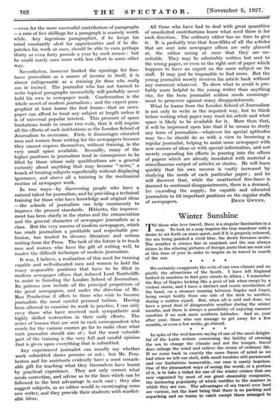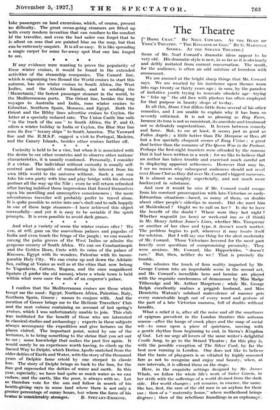Winter Sunshine
TO those who love travel, there is a singular fascination in a map. To look at a map inspires the true wanderer with a desire to set forth on some quest, and if it is properly coloured, the sea being painted a vivid blue, the desire becomes acute. The weather is always fine in mapland, and the sun always shines in the alluring pictures of foreign parts that are sent out at this time of year in order to inspire us to travel in search
of the sun. * *
We certainly exaggerate the evils of our own climate and we glorify the attractions of the South. I have left England bathed in sunshine.to find grey clouds in Africa ; I remember the Bay of Naples looking like a pool of ink when swept by a violent storm, and .I have a distinct and comic recollection of the band, on a steamer running between Naples and Capri, being swept bodily from one side of the deck to another, during a sudden squall. But, when all is said and done, we have a great deal of disagreeable weather during the winter months, and there is always a possibility of enjoying summer sunshine if we seek more southern latitudes. And so, year after year, those who can manage to get away for a few months, or even a few weeks, go abroad.
* * In spite of the well-known saying of one of the most delight. ful of the -Latin writers concerning the futility of crossing the sea to change the climate and not the temper, travel does enlarge the mind and relieve the strain of ordinary life. If we come back in exactly the same frame of mind as we had when we left our shell, with small troubles still paramount and our limitations immovable, our case is surely. hopeless. One of the pleasantest ways of seeing -the world, or a portion of it, is to take a ticket for one of the winter cruises that are now organized by most of our great steamship companies, the increasing popularity of which testifies to the manner in which they are run. The advantages of sea travel over land are various, not the least being that there is no packing and unpacking and no trains to catch except those arranged to
take passengers on land excursions, which, of course, present no difficulty. The great ocean-going steamers are fitted up with every modern invention that can conduce to the comfort Of the traveller, and even the bad sailor can forget that he is afloat on seas that are painted blue on the map, but that can be extremely unquiet. It is all so easy. It is like spreading a magic carpet for some far-away spot that one has longed to see. * * * * If any evidence were wanting to prove the popularity of these winter cruises, it would be found in the extended activities of the steamship companies. The Cunard line, which is organizing two Round the World cruises to start this autumn, has also winter cruises to South Africa, the West
Indies, and the Atlantic Islands, and is sending the Mauretania,' the fastest passenger steamer in the world, to the Mediterranean ports. The Orient line, besides the long voyages to Australia and India, runs winter cruises to Gibraltar, Southern Spain, Morocco, and Egypt. Both the Orient and the Bibby lines advertise cruises to Ceylon, the
latter at a specially reduced rate. The Union Castle line sails " in the track of the sun " to South Africa, the P. and 0. offers a winter holiday in India or Ceylon, the Blue Star line runs its five " luxury ships " to South America. The Yeoward line and the R.M.S.P. suggest a visit to Portugal, Madeira, and the Canary- Islands, besides other cruises farther off. * * * * Curiosity is held to be a vice, but when it is associated with the desire to see other countries and to observe other nations' characteristics, it is usually condoned. Personally, I consider it a virtue. The individual without curiosity is usually self- centred and incapable of transferring his interest from his own little world to the universe without. Such a one can take his own party with him and play bridge with his chosen partner all the way up the Nile ; even he will return refreshed after having imbibed those impressions that forced themselves upon his unwilling and unreceptive consciousness ; the more adventurous traveller will probably prefer to travel alone. It is quite possible to retire into one's shell and to sulk happily in one of these large steamers—I have achieved this object successfully—and yet it is easy to be sociable if the spirit prompts. It is even possible to avoid deck games.
* * * * And what a variety of scene the winter cruises offer ! We can, at will, gaze on the marvellous palaces and pagodas of India and even touch the fringe of the jungle ; we can wander among the palm groves of the West Indies or admire the gorgeous scenery of South Africa. We can see Constantinople and the Golden Horn, Crete with its ruins of the palace of Knossos, Egypt with its wonders, Palestine with its incom- parable Holy City. We can cruise up and down the Adriatic Sea, calling at Venice as well as at the cities that now belong to Yugoslavia, Cattaro, Ragusa, and the once magnificent Spalato (I prefer the old names), where a whole town is held within what were once the walls of an emperor's palace.
* * * * I confess that the Mediterranean cruises are those which
tempt me the most: Egypt, Northern Africa, Palestine, Italy, Southern Spain, Greece ; names to conjure with. And the mention of Greece brings me to the Hellenic Travellers' Club and the neat volume containing an account of last spring's cruises, which I was unfortunately unable to join. This club was instituted for the benefit of those who are interested in classical studies and archaeology ; experts in these subjects always accompany the expedition and give lectures on the places visited. The important point, noted by one of the lecturers, is to bring something to the shrine that you set out to see ; some knowledge that makes the past live again. It would surely be an experience worth having, to climb up the Sacred Way to Delphi, which Dorian Apollo snatched from the older deities of Earth and Water, with the story of the thousand years of Delphic fame retold by one steeped in classic lore. The story of Delphi brings us back to the Sun, for the Sun god superseded the deities of water and -earth. In this year, especially, we have had quite as much water as we can endure, and the earth, like the poor, is always with us, Let us therefore vote for the sun and follow in search of his, health-giving rays -in some land where there is not only a greater percentage of sunny hours, but -where the force of- his-



















































 Previous page
Previous page